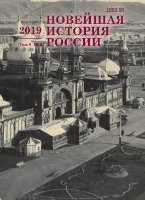Участие духовенства в политических партиях и надпартийных организациях на белом Юге в период Гражданской войны
The Participation of the Clergy in Political Parties and Public Political Movements in the White South During the Civil War
Author(s): Yuliya Aleksandrovna BiryukovaSubject(s): Political history, Government/Political systems, Politics and religion, Pre-WW I & WW I (1900 -1919), Eastern Orthodoxy
Published by: Издательство Исторического факультета СПбГУ
Keywords: Russian Orthodox Church; clergy; Russian Civil War; right-wing political party; White Movement; Union of Russian National Communities; Council of State Unification of Russia; Brotherhood of the Holy C
Summary/Abstract: This article examines the participation of representatives of the Russian Orthodox Church in public and political life in the White-controlled South. In particular, the motives and goals of church authorities’ interactions with political forces, activities of supra-party organizations with a wide representation of the Orthodox clergy, and the “church” aspects of their politics are examined. The significance attached by these organizations to union with the Orthodox Church and its place in the socio-political life of the country is described. The characteristic of the activity of the only Orthodox right-wing nationalist party “Brotherhood of the Holy Cross” and the identity of its organizer, Archpriest Vladimir Vostokov, are noted as well as the attitude of church authorities, clergy and the public to it. Put this way, the problem for the first time in historiography is subjected to a comprehensive study with a wide range of sources based on situation reports from the Fund of the Political office of the Chairperson of the special Meeting of the Volunteer army, and documentation of the Temporary higher Church administration and the periodicals of the South of Russia. Despite the wide participation of the clergy in political life, the organs of ecclesiastical administration studiously avoided politicization of the Church that would draw it into the political struggle. The Church saw its task only in national unity while preserving the balance of political forces under the authority of the Commander-in-chief as representative of the legitimate government — an ally of the Church in the face of Bolshevism.
Journal: Новейшая история России
- Issue Year: 9/2019
- Issue No: 29
- Page Range: 880-899
- Page Count: 20
- Language: Russian

